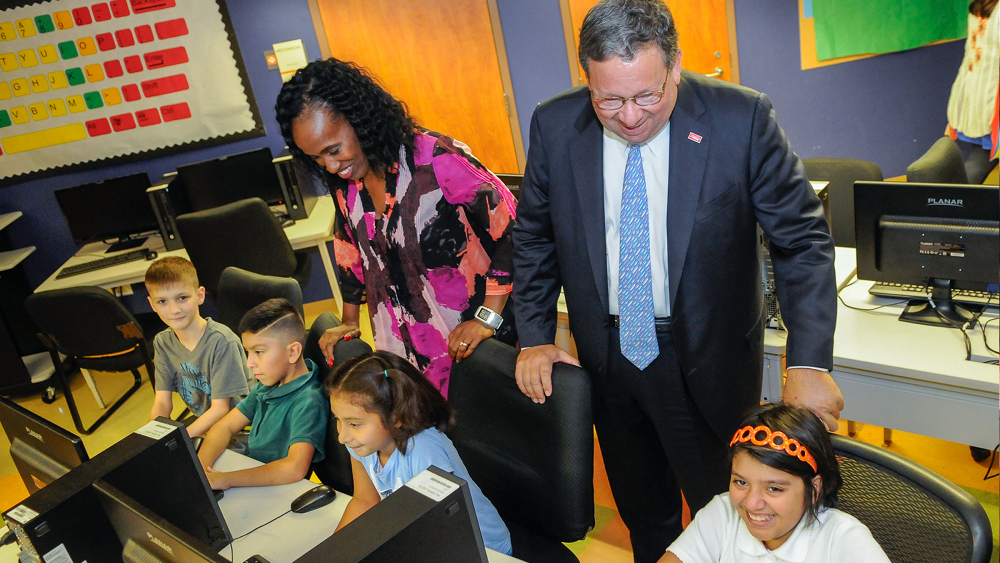Internet Essentials
California Is The #1 State In The Nation To Close The Digital Divide With Comcast’s Internet Essentials Program
Livermore, CA
Comcast donates $200,000 and 200 laptops to support digital literacy training efforts in the Bay Area.
Today, Comcast announced California is the top state in the nation to close the digital divide for low-income families. Nearly 115,000 families, or nearly 460,000 Californians, have signed up for home internet through Comcast’s acclaimed Internet Essentials program. Now entering its sixth year, Internet Essentials has connected 750,000 low-income families nationally, benefitting 3 million Americans, to home-based internet service.
The company also announced more than $200,000 in grants for Bay Area community organizations to build computer labs, create digital literacy training classes, and purchase technology equipment. In addition, the company donated 100 laptops to households at the George Davis Senior Center in San Francisco, and 100 laptops to families who attend PLACE @ Prescott Elementary School in Oakland.
In addition, Comcast announced it has partnered with Larry Magid, President and CEO of ConnectSafely.org, a California-based internet safety nonprofit, to release a free Online & Mobile Safety Guide for Seniors. The guide, which is available for download here, addresses the unique needs of seniors who are learning to use the internet for the first time.
"Since Internet Essentials first launched in 2011, we’ve made significant progress in connecting low-income families with children to the internet at home. In the past year, we opened up several new attacks on the digital divide, including pilot programs for low-income senior citizens and community college students," said David L. Cohen, Comcast Corporation Senior Executive Vice President and Chief Diversity Officer. "Additionally, we recently collaborated with the U.S. Department of Housing and Urban Development (HUD) to expand Internet Essentials to HUD-assisted homes. This furthers our reach to senior citizens, as 34 percent of HUD-funded households have someone at least 62 years of age residing with them. We look forward to bringing this essential connection to even more people in California and across the country."
"According to the Pew Research Center, as of 2014, nearly 60 percent of Americans over 65 years of age were internet users," said Larry Magid, President and CEO of ConnectSafey.org. "However, just as a travel guide is important when planning a trip to a foreign country, seniors need a guide to the online world, as the internet is like a foreign country to many. This is why we are proud to release the free Online & Mobile Safety Guide for Seniors today, thanks to the help of Comcast."
Cohen made these announcements today alongside six-time Olympic Medalist and Internet Essentials Spokesperson Jackie Joyner-Kersee, as part of a multi-city back-to-school tour where the company will announce more than $2 million in grants to community-based organizations that provide vital digital literacy training and internet access.
In San Francisco, the organizations receiving grants include: Self Help for the Elderly, Community Living Campaign, and Community Technology Network, Bayview Senior Services, Chinatown Community Development Center, Mission Housing Development Corporation, and Felton Institute – Family Service Agency of San Francisco.
In Oakland, the organizations include: The Oakland Citizens Committee for Urban Renewal (OCCUR), Oakland Private Industry Council, Spanish Speaking Citizens Foundation, Oakland Digital Arts & Literacy Center (ODALC), Qeyno Labs, and Oakland Technology Exchange West.
"Both in my athletic career and in the days since then, I’ve tried to inspire young people to commit to hard work in both academics and athletics," said Joyner-Kersee. "While growing up playing sports, all I ever wanted was a level playing field, a fair competition where those who had put in the hard work had a chance to shine. I’m proud to represent Internet Essentials because this program helps level the playing field for all families by connecting them to the power of the internet at home. Internet Essentials gives every child the chance to develop their fullest potential and reach for their dreams, whatever those dreams may be."
Today’s announcements follow recent news that Comcast has expanded the program’s eligibility to households receiving HUD-housing assistance, including public housing, Housing Choice Voucher, and Multifamily programs. In California there are 190,000 HUD-assisted homes that stand to benefit from this expansion. In total, there are up to 2 million HUD-assisted homes in Comcast’s service area across the country, which, according to HUD, accounts for approximately 40 percent of all HUD-assisted households. This expansion of eligibility means even more individuals, including seniors, veterans, and adults without children, can apply to the program.
Additionally, Comcast recently released a comprehensive Internet Essentials Five Year Progress Report, which includes significant new milestones highlighting the program’s impact on the lives of its customers since its launch in 2011.
Since 2011, Comcast has invested more than $300 million in cash and in-kind support to fund digital literacy initiatives nationally, reaching nearly 4.4 million people through national and local nonprofit community partners. Additional key program milestones and facts through June 2016 include:
Dedicated more than $1.8 million in grants to create Internet Essentials Learning Zones, where networks of nonprofit partners are working together to enhance public Internet access and increase family-focused digital literacy training in Atlanta, Baltimore Chicago, Denver, Fresno, and Seattle, among others.
Broadcast 8.5 million public service announcements, valued at nearly $110 million.
Provided more than 54,000 subsidized computers at less than $150 each.
Distributed nearly 53 million pieces of Internet Essentials program material for free.
Welcomed more than 6.4 million visitors to the Internet Essentials English and Spanish websites, and its Online Learning Center.
Fielded more than 4.4 million phone calls to our Internet Essentials call center.
Offered Internet Essentials to more than 55,000 schools in more than 5,000 school districts in 39 states and the District of Columbia.
Partnered with over 9,000 community-based organizations, government agencies, and federal, state, and local elected officials to spread the word.
In the past year, Internet Essentials opened up several new attacks on the digital divide, including pilot programs for low-income senior citizens and community college students.
